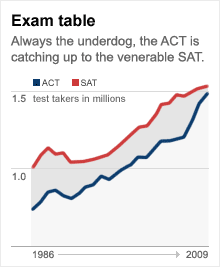The standardized-test smackdown
The makers of the SAT and ACT are fighting for market share as more college-bound students sit for entrance exams.

(Fortune Magazine) -- On the first Saturday in December, thousands of high school students will undergo that American rite called the SAT. A week later thousands more will take the ACT.
Despite burgeoning criticism of standardized testing, both exams remain key hurdles for getting into college. Students know that strong scores put you in the "good" pile at the Harvard admissions office and that weak scores can mean second-tier oblivion. But in addition to the race to the Ivies, another competition will be under way between the exams themselves and the nonprofit empires built around them.
The College Board -- which owns the SAT -- and American College Testing -- which owns the ACT -- are now engaged in an undeclared war for market share and mind share. And remarkably, the vaunted, venerable SAT is on the defensive.
The SAT, designed in theory to democratize admissions, has been around for more than 80 years. The ACT was created more recently, in 1959, and aimed at measuring classroom achievement rather than innate ability; for years the test was popular only in the Midwest and surrounding states.
Not until the last decade did the ACT pose a real challenge to SAT supremacy. For the high school class of 1999, the SAT/ACT share was 54.5% to 45.5%. For the class of 2009 there was virtual parity.
Both organizations still were doing just fine: The number of test takers had grown by almost a third (to more than 3 million), and the heads of both organizations earned salaries above $500,000.
Though a nonprofit, the College Board -- an organization that took in $631 million for the fiscal year, producing $57 million in "excess" (profit by any other name) -- couldn't ignore its loss of market share.
This fall the College Board launched Score Choice, which allows students to hide bad scores from universities -- something the ACT has always permitted.
It used to be that when you took the SAT more than once, all scores were reported. Now students can send only their best score from a single test date. The College Board said its goal was to "reduce stress." But the policy presumably would also mean more repeated tests.
The College Board denied any economic motivation, though internal e-mail indicated otherwise. In one message that became public, Laurence Bunin, a senior vice president, referred to "less kids taking the SAT ... threatening the viability of the program itself." The College Board declined to comment to Fortune.
For its part, the ACT insists it's not in a competition. "Our crazy philosophy is to try to keep up with students' needs," says Jon Erickson, a senior vice president. Of course, more students taking your test suggests you're meeting their needs, so market share becomes synonymous with mission. Neither group will disclose test-taker numbers for this fall. So it's impossible to tell whether Score Choice is paying dividends.
Critics of the arms race say it's the wrong question. "It's not clear how any of this is benefiting students," says Bruce Poch, vice president and dean of admissions at Pomona College. "In a traditional market, you choose the best product. Instead, here, consumers now are choosing both products." It's a great deal for two thriving businesses in a billion-dollar industry. Too bad you can't invest in them. ![]()
-
 The retail giant tops the Fortune 500 for the second year in a row. Who else made the list? More
The retail giant tops the Fortune 500 for the second year in a row. Who else made the list? More -
 This group of companies is all about social networking to connect with their customers. More
This group of companies is all about social networking to connect with their customers. More -
 The fight over the cholesterol medication is keeping a generic version from hitting the market. More
The fight over the cholesterol medication is keeping a generic version from hitting the market. More -
 Bin Laden may be dead, but the terrorist group he led doesn't need his money. More
Bin Laden may be dead, but the terrorist group he led doesn't need his money. More -
 U.S. real estate might be a mess, but in other parts of the world, home prices are jumping. More
U.S. real estate might be a mess, but in other parts of the world, home prices are jumping. More -
 Libya's output is a fraction of global production, but it's crucial to the nation's economy. More
Libya's output is a fraction of global production, but it's crucial to the nation's economy. More -
 Once rates start to rise, things could get ugly fast for our neighbors to the north. More
Once rates start to rise, things could get ugly fast for our neighbors to the north. More









